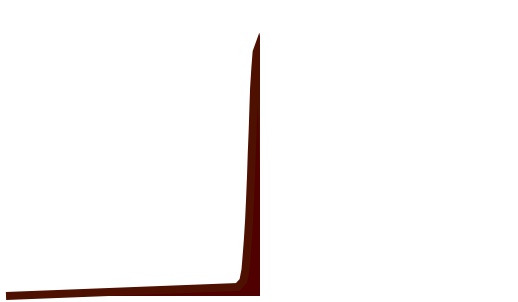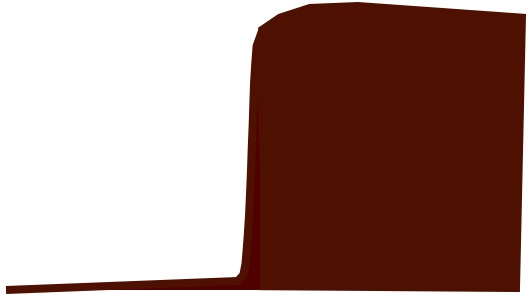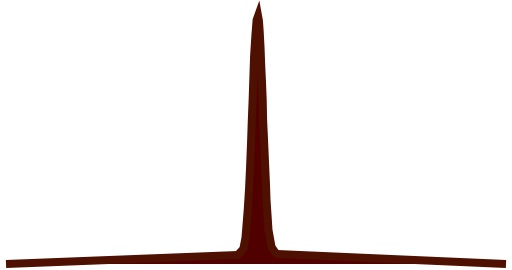| A few years ago I quit my high-pressure 60-hour-a-week job, for health reasons, and started to read again. In my youth I’d been an ardent environmentalist, so I started reading the books on the state of the world and how we might ‘save’ it. The more I read the more alarmed and dismayed I became.
When I looked at the major indicators of human activity, they all looked a little like this — increasing exponentially, with the “tipping point”, when the curve really took off, occurring in most cases about 1900, when the oil-powered economy began:

Population, resources extracted, land used, total consumption, violent human deaths, aggregate wealth — they all followed the same mind-boggling curve. When I looked a little closer, I could see these curves leveling off very slightly. At first I hoped and expected that these curves would end up looking like this:

But as I read more, and became a student of history, and sustainability, I began to recognize the curve to be something different — it is the left side of a “normal curve”:

I learned that there is no such thing as “sustainable growth”. Every civilization ends, and when it does, all its indicators describe a normal curve. It collapses quickly, and then, a shadow of its former self, slowly fades away. When I read and talked with climate scientists, and experts in non-renewable resources, and anthropologists, and population biologists, they explained that it isn’t a matter of if our civilization is going to end, but how and when. Jared Diamond and Ronald Wright, expert students of past civilizations, described the inexorable pattern of rise and fall in great detail.
In fact, I discovered, our civilization is already ending. What biologists call the “sixth great extinction” of biodiversity on Earth began millennia ago, and it is plunging down the right side of the normal curve slope faster than in any of the first five. Our human population is already twice the sustainable carrying capacity of the planet even with no allowance for any other living creatures, and is on pace to hit six times the planet’s carrying capacity before population peaks at 150% of today’s and resource use peaks at triple today’s.
I read more, growing more disturbed the more I learned. I learned that we are rapidly running out of almost every renewable resource — most notably oil, water, nutritive soil, ocean life and forests, and that species extinction is accelerating. I learned that we have already surpassed the level of atmospheric pollution that will inevitably create almost unimaginable climate change — disappearance of all the world’s forests, huge sea level rise, constant storms that will dwarf Katrina in ferocity and decimate vital human infrastructure, global-scale drought, flooding, and desertification. Even the most optimistic climate scientists are now acknowledging that the changes are accelerating and occurring faster and more intensely than they ever expected, and that we have already passed the “tipping point” — our civilization is now starting to become the latest casualty of the sixth great extinction. By the end of this century or early in the next, it is likely that human population will drop 90% from its mid-century peak, down the right side of the normal curve, even if we do our best to mitigate and adapt to these catastrophic changes.
The conclusion of this research, which is never discussed in the newspapers or other mainstream media, filled me with despair. The overwhelming weight of evidence was clear: The collapse of our civilization has already begun, there is no going back, and its effects are going to be unlike anything the world has seen since a cosmic accident caused the extinction of the dinosaurs 65 million years ago. The last part of this century is going to be chaos, as we slide down the normal curve. And then it’s going to get very quiet. Yet everyone seems to be in a state of total denial.
At first, as I read about what we’ve done, I thought of our civilization as a colossal failure. But as I thought more, and read some books of modern philosophy by thinkers like John Gray who have, like me, done their scientific research, I realized our civilization has been, by every measure, an astonishing success. What our species has accomplished since the start of the curve a mere couple of hundred thousand years ago, through ice ages and staggering challenges to our survival, is nothing short of miraculous. What we have created and maintained, against all the laws of nature, through thirty millennia of relentless struggle for ‘progress’, is simply awesome. We should be proud, not ashamed, of what we have done.
But, I thought, as I reflected on what I had learned, it’s time to let go. It is time, I concluded, to begin the cleaning up of the mess we made while we we were having so much fun with the grand human experiment. And, most importantly, I fervently believe it’s time to mitigate the damage we are doing now, so the suffering that has already begun can at least be minimized, and it’s time to learn to adapt to the changes we have unleashed so that the survivors of the collapse will be prepared for the brave, new, wonderful, uncivilized world they will inherit after we’ve gone. I think we owe them, and the world, that much.
So I turned my research to possible solutions, and I learned that most of the well-intentioned projects that got us to where we are today — industrial agriculture, globalization, the growth economy, high-tech and so on — are of no use whatsoever in managing descent, helping us with the transition to a post-civilization world.
Instead, we need to re-learn self-sufficiency and how to make things work on a small, community-based scale. So far I’ve discovered a consensus, among most of those who are working in the transition movement, for the value of the following 12 projects, and I offer them to you, for what they’re worth, as my personal action plan and my best guess answer to what we can do, today, to make a difference, and in our own modest way, to save the world:
My Knowing and Learning Projects:
- Understand What’s Happening: Before I can engage others and act purposefully and effectively I need to understand how this complex world really works (not what they tell you in school or in the media about how it works). I’m pretty far along in this.
- Imagine What’s Possible: Next, I need to be able to imagine a better world, one that is not addicted to growth and consumption. If I can’t imagine it, I will never be able to decide how to achieve it. I’m writing a novel to do this, based on what I’ve read about steady-state economies.
- Be Pragmatic and Realistic: There are many things I can do, and many wonderful-sounding but unenforced, unenforceable and/or ineffective regulations and actions, so I need to learn what actions actually work.
- Know Myself: Then, to assess what I can do about all this, I need to know myself, which means giving myself the time and space to discover who I really am, what my true gifts, passions and purpose are, and — what is at their intersection — what I’m meant to do.
- Build Personal Capacity: I then need to discover and acquire the additional capacities I need to be effective at bringing about change in the world. This doesn’t entail changing myself to be what I’m not, just learning some new skills and abilities. In my case, it’s presentation, demonstration and community survival skills.
My Teaching and Sharing Projects:
- Converse and Tell Stories: Once I’ve learned these things, I can start to engage others in enthusiastic, passionate, authentic conversation, so my efforts aren’t fragmented and isolated. Not to persuade, but to inform, explore opportunities, find allies.
- Engage Obstructionists: I need to talk with politicians and business people I know and meet, show them I care, present them with new, objective information, and proffer positive, practical ideas.
My Doing Projects:
- Be an Activist and Pioneer: I have to pick a focus: political, social, economic, health care or (probably for me) educational reform. We must organize to confront people with power who don’t respond to reasonable conversation and information-sharing. And show people the way by experimentation and example.
- Create Responsible, Sustainable Enterprises: My experience shows that rather than trying to reform existing organizations we must create new ‘natural’ enterprises that let us to do the work we are meant to do, and at the same time to stop supporting, with our labour and tax dollars, unsustainable organizations.
- Be a Model: I will live a life that’s sufficient (comfortable but not extravagant or wasteful), loving, tolerant, attentive (listen more than I talk), responsible (no complaining, just doing), and sustainable. And persuade people that having more than one child in this overcrowded world is an irresponsible, unsustainable act.
- Create a Model Community: Likewise, I need to co-create a collaborative, stewardship community that’s a model alternative to the wasteful, ineffective, alienating, isolating ‘neighbourhoods’ of wary strangers living near each other solely because of a mutual proximity to their place of work.
- Be Good to Myself: And I must be good to myself and those I love, and not be consumed by guilt, or despair, or grief, or neglect my health and well-being. We have to pace ourselves and look after ourselves, and each other, and celebrate our successes, if we hope to continue to make a difference.
|








I have researched and written about many of the same topics you have and have been discouraged myself. But one brilliant friend of mine mentioned our capacity to evolve as human beings, throughout the centuries has and will save us. He might be right, we have been in some pretty big messes before.
Wow,You mind simply amazes me. Do you find time to sleep. Such deep thoughts and expansive perspectives that are communicated so well. Thank you.David
Yikes, you write well and I can’t even get my second word right….your.I guess those that can do and those that can’t (like me) should just read.
The challenge of memorizing it, and the other stories I plan to write, is more imposing. I never had to memorize in school. Am I too old to learn?IMO depends upon the exactitude you want to bring to the memorization. As I read your intro and lead up to the list of projects, and the list itself, itseems to me that it is pretty close to an exact summary of what you have been writing about for these past five years.My sense is that is you just start talking it will pour out no problem, because it is in and of you. You may need to rehearse a couple of times .. depends upon who you want to impress and why you are “pitching” this to them, I think/
I was gonna say pretty much exactly what Jon just did…. work through your ordering and bullets and then just let it flow :-)Janene
I left a comment on your FB posting of this article, but wanted to link to the public article on my blog so non FB users could find it. Your article led me to the heart of some profound soul searching that has been “up” for me the last couple days. Thanks for that. You can read the article I wrote in response on my Indigo Ocean blog if you want to. I’m still sorting out my answers. Hopefully as we share our stories/searches with one another, we help each other develop clarity.(I keep getting forbidden 403 errors when I try to submit this comment, so I’ll try again removing the link to my website, which hopefully you can instead reach through my name link, if you care to read the article, which is on the front page right now. Hopefully this won’t result in duplicate posts of this comment.)
Dave, it sounds as if you are fixing to join Toastmasters (but would that be a bad idea?). I do believe in the usefulness of a five-minute narrative, and feel inspired to try and write my own. One suggestion, though–try and stay away from lists. That may have been what you meant regarding your text being more of a writer than a speaker.William
Hi Dave (or others),I have similar (dire) expectations for our civilization. I wonder if you, and all like-minded people, should spend the majority of your brainpower developing strategies to simply survive; to be among the 10 %(?) that stay alive beyond the mess that is fast approaching.Teaching takes time; do you believe we have time? Or, are the unpleasant and tough tasks of basic survival just so daunting that we constantly push them to the bottom of our to-do lists?
YES – you have constructed a SUSTAIN -a- monial. How I came to the realisation we need to transition.I’ll happily publish others stories on my site http://avbp.net